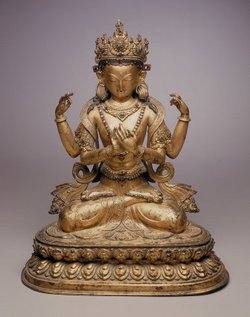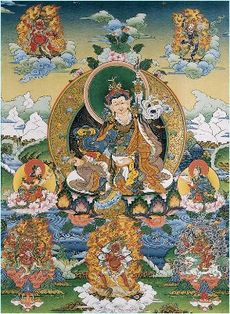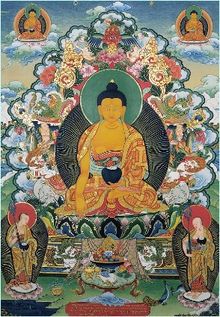Difference between revisions of "The Rangjung Yeshe Gilded Palace of Dharmic Activity"
Kent Sandvik (talk | contribs) m (The Rangjung Yeshe Guilded Palace of Dharmic Activity moved to The Rangjung Yeshe Gilded Palace of Dharmic Activity) |
|||
| (173 intermediate revisions by 5 users not shown) | |||
| Line 1: | Line 1: | ||
| − | == ''A Glossary of Buddhist People, Places, and Things...'' = | + | <div style="top:+0.2em;font-size: 110%"> |
| − | ''- '''The Terms by which | + | <center>'''~~ <span class=TibUni20>[[རང་བྱུང་ཡེ་ཤེས་ཕིབ་རྒྱ་དཀོན་མཆོག་ཕོ་བྲང་ཆོས་ཀྱི་ཕྲིན་ལས།]]</span> ~~'''</center></div> |
| + | ---- | ||
| + | <center>'''''~~ A Glossary of Buddhist People, Places, and Things...~~'''''</center> | ||
| + | ---- | ||
| + | <table align="center"> | ||
| + | <tr> | ||
| + | <td>[[Image:Buddha_6.jpg|thumb|220px|<center>'''[[Buddhas of the Three Times]]''']]</center></td> | ||
| + | <td>[[Image:PrajnaParamita.jpg|thumb|250px|<center>'''[[Prajnaparamita]]''' - ([[sher phyin ma]]) - </center><center><BR>{{:sher phyin ma}}</center><center>Guardian Deity of [[The Perfection of Wisdom]] - [[Mother of All Buddhas]]<br>(picture source unknown)</center>]]</td> | ||
| + | <td>[[Image:Padmadsat_6.jpg|thumb|230px|<center>'''[[Padmasambhava]] Refuge''']]</center></td> | ||
| + | </tr> | ||
| + | </table> | ||
| + | ---- | ||
| + | <center>''''' ~~ The Terms by which These Are Defined ~~ '''''</center> | ||
| + | ---- | ||
| + | --'''Alphabetical Listing:'''<br> | ||
| + | <center>'''[[A]]''' - '''[[B]]''' - '''[[C]]''' - '''[[D]]''' - '''[[E]]''' - '''[[F]]''' - '''[[G]]''' - '''[[H]]''' - '''[[I]]''' - '''[[J]]''' - '''[[K]]''' - '''[[L]]''' - '''[[M]]''' - '''[[N]]''' - '''[[O]]''' - '''[[P]]''' - '''[[Q]]''' - '''[[R]]''' - '''[[S]]''' - '''[[T]]''' - '''[[U]]''' - '''[[V]]''' - '''[[W]]''' - '''[[X]]''' - '''[[Y]]''' - '''[[Z]]'''</center> | ||
| + | ---- | ||
| + | ''''' "It is all right not to know the Tibetan language. As long as you can read, you can absorb the [[Dharma]] terminology, the Buddhist key words. Many learned people have told me that the majority of Buddhist scriptures exist in the Tibetan language. Second is Chinese; after that there is Japanese, Pali, and so forth. Nevertheless, Tibetan is foremost in quantity. Someone who wants to do detailed studies, can study to their heart's delight in the Tibetan medium, without running out of texts".''''' | ||
| − | + | Quoted from an interview with '''''[[Chokyi Nyima Rinpoche]]''''' '''-''' <span class=TibUni16>[[ཆོས་ཀྱི་ཉི་མ་རིན་པོ་ཆེ།]]</span> | |
---- | ---- | ||
| − | ''' | + | '''Note:''' To review the images above, their source, more details and availability, please see '''http://www.thangka.ru/gallery_e.html'''. ''Thank you Nick!''<br> |
| − | |||
| − | |||
| − | |||
| − | |||
| − | |||
| − | |||
| − | |||
| − | |||
| − | |||
| − | |||
| − | |||
| − | |||
| − | |||
| − | |||
| − | |||
| − | |||
| − | |||
| − | |||
| − | |||
| − | |||
| − | |||
| − | |||
| − | |||
| − | |||
<br> | <br> | ||
| − | + | (Review other [[Special:Categories|Categories]]) | |
<br> | <br> | ||
| − | |||
<br> | <br> | ||
| − | |||
| − | |||
| − | |||
| − | |||
| − | |||
| − | |||
| − | |||
| − | + | [[Category: Glossary]][[Category: Dictionary]][[Category: Key Terms]][[Category: Teachings]] | |
| − | |||
| − | |||
| − | [[ | + | --(A Work in Progress) --[[User:Richard|Richard]] 04:32, 16 April 2009 (UTC)-- |
Latest revision as of 00:32, 16 April 2009
 ཋེ་ཪངཇུང་ཡེཤེ་Gཨིལྡེད་Pཨལཅེ་ཨོཕ༹་ཌྷརྨིཅ་ཨཱཅཏིབི༹ཏཡ ཤེར་ཕྱིན་མ། (picture source unknown) |
 |
--Alphabetical Listing:
"It is all right not to know the Tibetan language. As long as you can read, you can absorb the Dharma terminology, the Buddhist key words. Many learned people have told me that the majority of Buddhist scriptures exist in the Tibetan language. Second is Chinese; after that there is Japanese, Pali, and so forth. Nevertheless, Tibetan is foremost in quantity. Someone who wants to do detailed studies, can study to their heart's delight in the Tibetan medium, without running out of texts".
Quoted from an interview with Chokyi Nyima Rinpoche - ཆོས་ཀྱི་ཉི་མ་རིན་པོ་ཆེ།
Note: To review the images above, their source, more details and availability, please see http://www.thangka.ru/gallery_e.html. Thank you Nick!
(Review other Categories)
--(A Work in Progress) --Richard 04:32, 16 April 2009 (UTC)--
